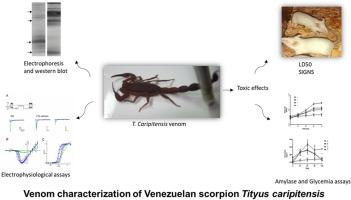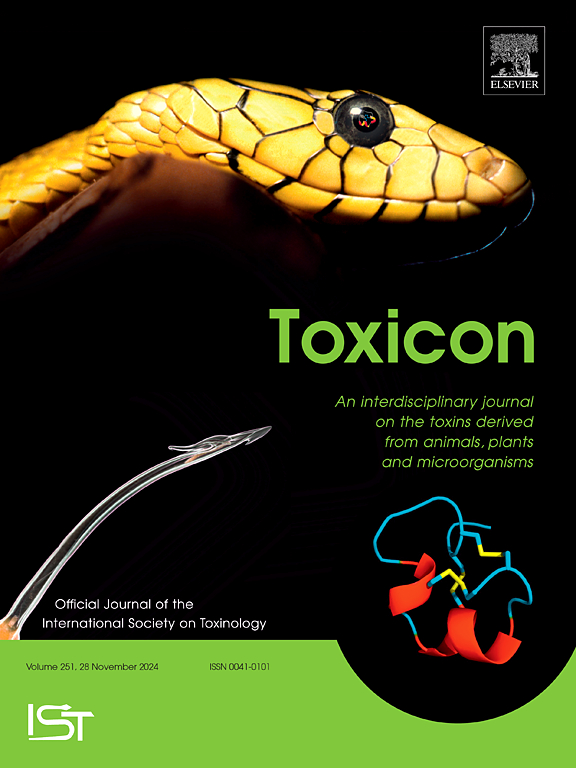委内瑞拉蝎子 Tityus caripitensis 的毒液特征。
IF 2.6
4区 医学
Q2 PHARMACOLOGY & PHARMACY
引用次数: 0
摘要
Tityus caripitensis 是委内瑞拉东北部地区特有的一种蝎子,是该地区螫伤事故的罪魁祸首。本研究首次描述了 Tityus caripitensis 蝎毒的生物、生物化学和电生理学部分特征。该毒液对小鼠具有毒性,半数致死剂量为 20.2 微克/克小鼠。用 Tityus caripitensis 毒液进行实验性毒杀的动物在达到亚致死剂量后会逐渐出现临床症状。对毒液进行 SDS-PAGE 分析可得到 7 个大小从 3.5 到 38 kDa 不等的馏分。6-8 kDa 的蛋白质可能是神经毒素。此外,Tityus caripitensis 毒液中的成分与 Tityus discrepans 的电泳图谱中的成分相似。抗Tityus discrepans的商品IgG对Tityus caripitensis毒液有反应性。Tityus caripitensis 毒液可引起血液学变化,如高淀粉血症和高血糖。毒液可改变电压依赖性 Na+v1.4 通道并阻断 Kv+ 通道。虽然 Tityus caripitensis 毒液的毒性低于 Tityus discrepans,但它们具有相同的分子和抗原成分。在应用抗蛇毒血清治疗时应考虑到这一点。本文章由计算机程序翻译,如有差异,请以英文原文为准。

Venom characterization of Venezuelan scorpion Tityus caripitensis
Tityus caripitensis is an endemic scorpion species found in the northeastern region from Venezuela, being responsible for sting accidents in this area. This study describes for the first time a biological, biochemical and electrophysiological partial characterization of Tityus caripitensis scorpion venom. The venom is toxic to mice with a LD50 of 20.2 μg/gr mouse. Animals experimentally envenomed with Tityus caripitensis venom gradually manifested clinical signs in response to sublethal doses. SDS-PAGE of the venom resulted in 7 fractions ranging in size from ∼3.5 to ≥38 kDa. The 6–8 kDa proteins could correspond to neurotoxins. In addition, the components of Tityus caripitensis venom were similar to those obtained in the electrophoretic profile of Tityus discrepans. The commercial anti- Tityus discrepans IgG showed reactivity against Tityus caripitensis venom. Tityus caripitensis venom could induce hematological changes such as hyperamylasemia and hyperglycemia. The venom modified voltage dependent Na + v1.4 channels and blocked Kv + channels. Although Tityus caripitensis venom is less toxic than Tityus discrepans, they share molecular and antigenic components. This aspect should be considered in the application of antivenom treatment.
求助全文
通过发布文献求助,成功后即可免费获取论文全文。
去求助
来源期刊

Toxicon
医学-毒理学
CiteScore
4.80
自引率
10.70%
发文量
358
审稿时长
68 days
期刊介绍:
Toxicon has an open access mirror Toxicon: X, sharing the same aims and scope, editorial team, submission system and rigorous peer review. An introductory offer Toxicon: X - full waiver of the Open Access fee.
Toxicon''s "aims and scope" are to publish:
-articles containing the results of original research on problems related to toxins derived from animals, plants and microorganisms
-papers on novel findings related to the chemical, pharmacological, toxicological, and immunological properties of natural toxins
-molecular biological studies of toxins and other genes from poisonous and venomous organisms that advance understanding of the role or function of toxins
-clinical observations on poisoning and envenoming where a new therapeutic principle has been proposed or a decidedly superior clinical result has been obtained.
-material on the use of toxins as tools in studying biological processes and material on subjects related to venom and antivenom problems.
-articles on the translational application of toxins, for example as drugs and insecticides
-epidemiological studies on envenoming or poisoning, so long as they highlight a previously unrecognised medical problem or provide insight into the prevention or medical treatment of envenoming or poisoning. Retrospective surveys of hospital records, especially those lacking species identification, will not be considered for publication. Properly designed prospective community-based surveys are strongly encouraged.
-articles describing well-known activities of venoms, such as antibacterial, anticancer, and analgesic activities of arachnid venoms, without any attempt to define the mechanism of action or purify the active component, will not be considered for publication in Toxicon.
-review articles on problems related to toxinology.
To encourage the exchange of ideas, sections of the journal may be devoted to Short Communications, Letters to the Editor and activities of the affiliated societies.
 求助内容:
求助内容: 应助结果提醒方式:
应助结果提醒方式:


